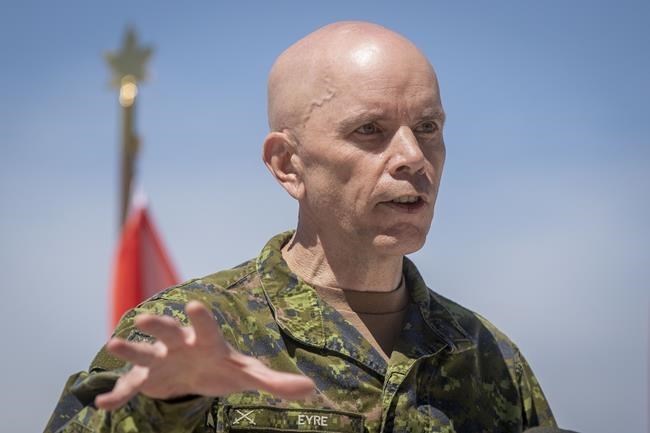OTTAWA — Defence chief Gen. Wayne Eyre is reviewing the Canadian military's COVID-19 vaccine mandate, which remains in effect even though a similar requirement for most other federal employees has been suspended.
Eyre first ordered all troops vaccinated against COVID-19 in October, saying the requirement was intended to protect the Armed Forces and “demonstrate leadership” as the Liberal government adopted vaccine mandates across the federal public service.
Yet while the majority of federal mandates were lifted Monday, including for civilians working in the Department of National Defence and members of the RCMP, the requirement still applies to those serving in military uniform.
“We are currently reviewing the (mandate) in order to maintain a safe working environment while remaining ready to conduct CAF operations in support of Canadians at home and around the world,” Defence Department spokeswoman Jessica Lamirande said.
“In the meantime, the (mandate) remains in effect for CAF members until further notice.”
Those who refused to comply with the order were warned they could face disciplinary proceedings, including their forced removal from the military.
That stood in contrast with non-military employees, who were allowed to go on leave without pay and have since been cleared to return to work now that the requirement has been lifted.
While most service members complied with the order, with the Defence Department reporting more than 98 per cent of Canadian troops had chosen to get vaccinated, hundreds of others did not.
More than 200 full-time members have since been ordered to leave the military after refusing to get inoculated, according to Lamirande, while another 100 voluntarily hung up their uniforms rather than get their jabs.
Senior commanders have also provided numerous warnings, counselling sessions and other efforts to convince vaccine-resistant troops to change their minds and get their jabs.
More than 800 troops still in uniform have been issued warnings, Lamirande said, while formal reviews have been launched against 463 members who continue to defy the vaccination order after other remedial measures have been exhausted.
As for the more than 1,300 Armed Forces members who applied for an exemption from the requirement for medical or religious reasons, only 157 have had their requests approved.
Asked whether commanders have been ordered to pause the disciplining or forced release of their troops pending the results of Eyre’s review, Lamirande said there is “no hold on releases as the (mandate) remains in place for the time being.”
That doesn’t sit well with lawyer Phillip Millar, who is representing dozens of unvaccinated Armed Forces members seeking to challenge the vaccine mandate in court.
Millar said he was supposed to appear in Federal Court on behalf of one client this week to argue for an injunction against the mandate until military officials asked for a delay while the Armed Forces, in his words, “gets its policy together.”
The case is now scheduled to be heard by the Federal Court early next month, but Millar said every day that the military’s vaccine requirement remains in place means more troops being shown the door for no legitimate reason.
“This grey zone right now is very destructive,” he said. “The only reason they did it was because, they cited, the rest of the country was doing it and it was necessary. … They don't have a leg to stand on anymore.”
Retired lieutenant-general Guy Thibault, who previously served as vice-chief of the defence staff, said the military’s top priority is protecting the Armed Forces and making sure it is ready and able to respond to whatever mission is thrown at it.
At the same time, he noted that the military is facing a severe personnel shortage and that not all missions and operations require the same level of protection and safeguards.
“The only real option that the Canadian Forces has right now, and the leadership has right now, is to acknowledge the fact that it can't be a one-size-fits-all,” said Thibault, who is now chair of the Conference of Defence Associations Institute.
As for those service members who have already left or been forced out of the military, Thibault said the issue is that they ultimately decided not to follow an order from their top commander.
And while some may argue the order wasn’t lawful, he said, that will be up to the courts and military grievance process to decide.
“But where you start to sit and think is: ‘OK, look, you don't want to serve in the Canadian Armed Forces? Fine. Go do something different,’” Thibault said.
“But respect that the chief of defence staff has the responsibility to look after the force protection of Canada's Armed Forces and make sure that we're ready to fight.”
This report by The Canadian Press was first published June 21, 2022.
Lee Berthiaume, The Canadian Press



